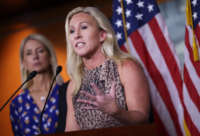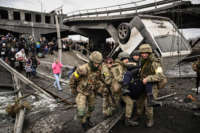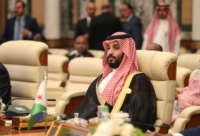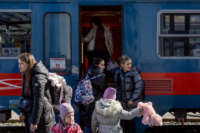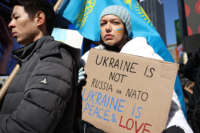
Russia’s invasion of Ukraine has been widely described as the beginning of a new cold war, much like the old one in both its cast of characters and ideological nature. “In the contest between democracy and autocracy, between sovereignty and subjugation, make no mistake — freedom will prevail,” President Biden asserted in a televised address to the nation the day Russian tanks rolled into Ukraine. But while Russia and the West disagree on many issues of principle, this is not a replay of the Cold War. It’s an all-too-geopolitical twenty-first-century struggle for advantage on a highly contested global chessboard. If comparisons are in order, think of this moment as more akin to the situation Europe confronted prior to World War I than in the aftermath of World War II.
Geopolitics — the relentless struggle for control over foreign lands, ports, cities, mines, railroads, oil fields, and other sources of material and military might — has governed the behavior of major powers for centuries. Think of Gibraltar, Pearl Harbor, the diamond mines of Africa, or the oil fields of the Middle East. Aspiring world powers, from the Roman Empire on, have always proceeded from the assumption that acquiring control over as many such places as possible — by force if necessary — was the surest path to greatness.
During the Cold War, it was considered uncouth in governing circles to openly express such blatantly utilitarian motives. Instead, both sides fabricated lofty ideological explanations for their intense rivalry. Even then, though, geopolitical considerations all too often prevailed. For example, the Truman Doctrine, that early exemplar of Cold War ideological ferocity, was devised to justify Washington’s efforts to resist Soviet incursions in the Middle East, then a major source of oil for Europe (and of revenue for American oil firms).
Today, ideological appeals are still deployed by top officials to justify predatory military moves, but it’s becoming ever more difficult to disguise the geopolitical intent of so much international behavior. Russia’s assault on Ukraine is the most ruthless and conspicuous recent example, but hardly the only one. For years now, Washington has sought to counter China’s rise by bolstering U.S. military strength in the western Pacific, prompting a variety of countermoves by Beijing. Other major powers, including India and Turkey, have also sought to extend their geopolitical reach. Not surprisingly, the risk of wars on such a global chessboard is likely to grow, which means understanding contemporary geopolitics becomes ever more important. Let’s begin with Russia and its quest for military advantage.
Fighting for Position in the European Battlespace
Yes, Russian President Vladimir Putin has justified his invasion in ideological terms by claiming that Ukraine was an artificial state unjustly detached from Russia. He’s also denigrated the Ukrainian government as infiltrated by neo-Nazis still seeking to undo the Soviet Union’s victory in World War II. These considerations seem to have grown more pervasive in Putin’s mind as he assembled forces for an attack on Ukraine. Nevertheless, these should be viewed as an accumulation of grievances overlaying an all too hardcore set of geopolitical calculations.
From Putin’s perspective, the origins of the Ukrainian conflict date back to the immediate post-Cold War years, when NATO, taking advantage of Russia’s weakness at the time, relentlessly expanded eastward. In 1999, three former Soviet-allied states, Hungary, Poland, and the Czech Republic, all previously members of the Warsaw Pact (Moscow’s version of NATO), were incorporated into the alliance; in 2004, Bulgaria, Romania, and Slovakia were added, along with three former actual republics of the Soviet Union (Estonia, Latvia, and Lithuania). For NATO, this staggering enlargement moved its own front lines of defense ever farther from its industrial heartlands along the Atlantic and Mediterranean coasts. Meanwhile, Russia’s front lines shrank hundreds of miles closer to its borders, putting its own heartland at greater risk and generating deep anxiety among senior officials in Moscow, who began speaking out against what they saw as encirclement by hostile forces.
“I think it is obvious that NATO expansion does not have any relation with the modernization of the Alliance itself or with ensuring security in Europe,” Putin declared at a Munich Security Conference in 2007. “On the contrary, it represents a serious provocation that reduces the level of mutual trust. And we have the right to ask: against whom is this expansion intended?”
It was, however, NATO’s 2008 decision to offer membership to Georgia and Ukraine, two former Soviet republics, that thoroughly inflamed Moscow’s security anxieties. After all, Ukraine shares a 600-mile border with Russia, overlooking a large swath of its industrial heartland. Should it ever actually join NATO, Russian strategists feared, the West could deploy powerful weapons, including ballistic missiles, right on its border.
“The West has explored the territory of Ukraine as a future theater, future battlefield, that is aimed against Russia,” Putin declared in a fire-breathing address on February 21st, just before Russian tanks crossed the Ukrainian border. “If Ukraine was to join NATO it would serve as a direct threat to the security of Russia.”
For Putin and his top security aides, the invasion was primarily intended to preclude such a future possibility, while moving Russia’s front lines farther from its own vulnerable heartland and thereby enhancing its strategic advantage in the European battlespace. As it happens, they seem to have underestimated the strength of the forces arrayed against them — both the determination of ordinary Ukrainians to repel the Russian military and the West’s unity in imposing harsh economic sanctions — and so are likely to emerge from the fighting in a worse position. But any geopolitical foray of this magnitude entails such draconian risks.
Mackinder, Mahan, and U.S. Strategy
Washington, too, has been guided by cold-blooded geopolitical considerations over the past century-plus and, like Russia, has often faced resistance as a result. As a major trading nation with a significant dependence on access to foreign markets and raw materials, the U.S. has long sought control over strategic islands globally, including Cuba, Hawaii, and the Philippines, using force when needed to secure them. That quest continues to this day, with the Biden administration seeking to preserve or expand U.S. access to bases in Okinawa, Singapore, and Australia.
In such endeavors, U.S. strategists have been influenced by two major strands of geopolitical thinking. One, informed by the English geographer Sir Halford Mackinder (1861-1947), held that the combined Eurasian continent possessed such a large share of global wealth, resources, and population that any nation capable of controlling that space would functionally control the world. From that followed the argument that “island states” like Great Britain and, metaphorically speaking, the United States, had to maintain a significant presence on the margins of Eurasia, intervening if necessary to prevent any single Eurasian power from gaining control over all the others.
The American naval officer Alfred Thayer Mahan (1840-1914) similarly held that, in a globalizing world where access to international commerce was essential to national survival, “control of the seas” was even more critical than control of Eurasia’s margins. An ardent student of British naval history, Mahan, who served as president of the Naval War College in Newport, Rhode Island, from 1886 to 1893, concluded that, like Britain, his country must possess a powerful navy and a range of overseas bases to advance its status as a preeminent global trading power.
From 1900 on, the United States has pursued both geopolitical strategies, though on opposite sides of Eurasia. With respect to Europe, it has largely hewed to Mackinder’s approach. During World War I, despite widespread domestic misgivings, President Woodrow Wilson was persuaded to intervene by the Anglo-French argument that a German victory would lead to a single power capable of dominating the world and so threatening vital American interests. The same line of reasoning led President Franklin Roosevelt to support U.S. entry into World War II in Europe and his successors to deploy substantial forces there to prevent the Soviet Union (today, Russia) from dominating the continent. This, in fact, is NATO’s essential reason for existing.
In the Asia-Pacific theater, however, the United States has largely followed Mahan’s approach, seeking control over island military bases and maintaining the region’s most powerful naval force. When, however, the U.S. has gone to war on the Asian mainland, as in Korea and Vietnam, disaster and ultimate withdrawal followed. As a result, Washington’s geopolitical strategy in our time has focused on maintaining island military bases across the region and ensuring that this country keeps its overwhelming naval superiority there.
Great-Power Competition in the Twenty-First Century
In this century, Washington’s increasingly fraught post-9/11 global war on terror (GWOT), with its costly and futile invasions of Afghanistan and Iraq, came to be viewed by many strategists in Washington as a painful and misguided diversion from a long-established focus on global geopolitics. A fear only grew that it was providing China and Russia with opportunities to advance their own geopolitical ambitions, while the U.S. was distracted by terrorism and insurgency. By 2018, America’s senior military leadership, reaching the end of its patience with the endless war on terror, proclaimed a new strategic doctrine of “great-power competition” — a perfect euphemism for geopolitics.
“In this new era of great power competition, our warfighting advantages over strategic competitors are being challenged,” explained Secretary of Defense Mark Esper in 2019. As the Pentagon winds down the GWOT, he noted, “we are working to re-allocate our forces and equipment to priority theaters that enable us to better compete with China and Russia.”
That, he went on to explain, would require concerted action on two fronts: in Europe against an increasingly assertive, well-armed Russia, and in Asia against an ever more powerful China. There, Esper sought an accelerated buildup of air and naval forces along with ever closer military cooperation with Australia, Japan, South Korea, and — increasingly — India.
In the wake of this country’s Afghan War defeat, such an outlook has been embraced by the Biden administration which, at least until the current crisis over Ukraine, saw China, not Russia, as the greatest threat to America’s geopolitical interests. Because of its growing wealth, enhanced technological capacity, and ever-improving military, China alone was viewed as capable of challenging American dominance on the geopolitical chessboard. “China, in particular, has rapidly become more assertive,” the White House stated in its Interim National Security Strategic Guidance of March 2021. “It is the only competitor potentially capable of combining its economic, diplomatic, military, and technological power to mount a sustained challenge to a stable and open international system.”
In early February, to provide high-level guidance for a “whole-of-nation” struggle to counter China, the White House issued a new “Indo-Pacific Strategy,” just as Russia was mobilizing its forces along Ukraine’s borders. Describing the Indo-Pacific as the true epicenter of world economic activity, the strategy called for a multifaceted effort to bolster America’s strategic position and — to use a word from another age — contain China’s rise. In a classic expression of geopolitical thinking, it stated:
“Our objective is not to change [China] but to shape the strategic environment in which it operates, building a balance of influence in the world that is maximally favorable to the United States, our allies and partners.”
In implementing this blueprint, Biden’s national security team views key islands and sea passages as vital to its strategy for containing China. Its senior officials have emphasized the importance of defending what they call the “first island chain” — including Japan and the Philippines — that separates China from the open Pacific. Smack in the middle of that chain is, of course, Taiwan, claimed by China as its own and now viewed in Washington (in a typical Mahanian fashion) as essential to U.S. security.
In that context, Assistant Secretary of Defense for Indo-Pacific Affairs Ely Ratner told the Senate Foreign Relations Committee in December:
“I’d like to begin with an overview of why Taiwan’s security is so important to the United States. As you know, Taiwan is located at a critical node within the first island chain, anchoring a network of U.S. allies and partners that is critical to the region’s security and critical to the defense of vital U.S. interests in the Indo-Pacific.”
From Beijing’s point of view, however, such efforts to contain its rise and prevent its assertion of authority over Taiwan are intolerable. Its leaders have repeatedly insisted that U.S. interference there could cross a “red line,” leading to war. “The Taiwan issue is the biggest tinderbox between China and the United States,” said Qin Gang, China’s ambassador to the U.S., recently. “If the Taiwanese authorities, emboldened by the United States, keep going down the road for independence, it most likely will involve China and the United States, the two big countries, in the military conflict.”
With Chinese warplanes regularly intruding on Taiwan-claimed airspace and U.S. warships patrolling the Taiwan Strait, many observers expected that Taiwan, not Ukraine, would be the site of the first major military engagement arising from the great-power competition of this era. Some are now suggesting, ominously enough, that a failure to respond effectively to Russian aggression in Ukraine could induce Chinese leaders to begin an invasion of Taiwan, too.
Other Flashpoints
Unfortunately, Ukraine and Taiwan are hardly the only sites of contention on the global chessboard today. As great-power competition has gained momentum, other potential flashpoints have emerged because of their strategic location or access to vital raw materials, or both. Among them:
- The Baltic Sea area containing the three Baltic republics (and former SSRs), Estonia, Latvia, and Lithuania, all now members of an expanded NATO. Vladimir Putin would ideally like to strip them of their NATO membership and once again place them under some form of Russian hegemony.
- The South China Sea, which borders China as well as Brunei, Indonesia, Malaysia, the Philippines, and Vietnam. China has laid claim to almost this entire maritime expanse and the islands within it, while employing force to prevent other claimants from exercising their developmental rights in the area. Under Presidents Trump and Biden, the U.S. has vowed to help defend those claimants against Chinese “bullying.”
- The East China Sea, its uninhabited islands claimed by both China and Japan. Each of them has sent combat planes and ships into the area to assert their interests. Late last year, Secretary of State Antony Blinken assured Japan’s foreign minister that Washington recognizes its island claims there and would support its forces if China attacked them.
- The border between India and China, which has been the site of periodic clashes between the militaries of those two countries. The U.S. has expressed sympathy for India’s position, while pursuing ever closer military ties with that country.
- The Arctic, claimed in part by Canada, Greenland, Norway, Russia, and the United States, is believed to harbor vast reserves of oil, natural gas, and valuable minerals, some lying in areas claimed by two or more of those countries. It is also seen by Russia as a safe haven for its nuclear-missile submarines and by China as a potential route for trade between Asia and Europe.
In recent years, there have been minor clashes or incidents in all of these locations and their frequency is on the rise. In the wake of the Russian invasion of Ukraine, tensions are only going to increase globally, so keep an eye on these flashpoints. History suggests that global geopolitics rarely ends peacefully. Under the circumstances, a new cold war — with militaries largely frozen in place — might just prove good news and that’s about as depressing as it gets.
This post was originally published on Latest – Truthout.

